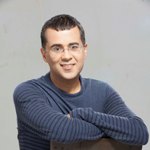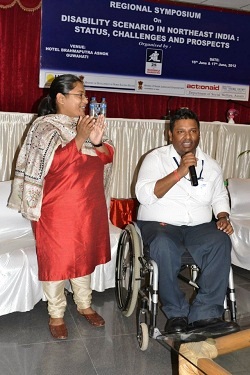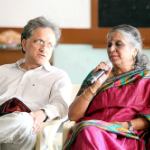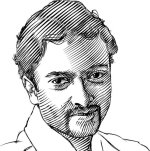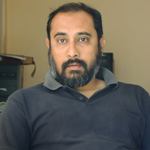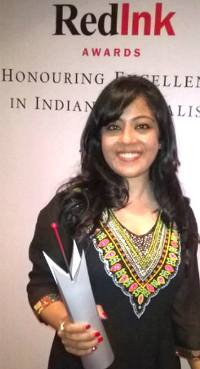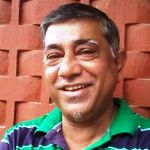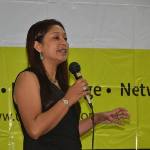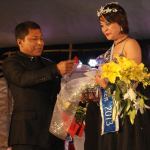Poetry Editor ANANYA S GUHA's note:
Almond Syiem's poems have an infinite lyrical quality about them. They can be sung! Also a singer and musician, Almond's poems have a music of their own, they are urgently felt narratives telling stories that are introspective of passion and compassion. They are varied and universal in their themes from the local to the global. A widely published poet, Almond who serves as a missionary is enmeshed in his apocalyptic fits, and breathes, through his words sheer lyrical poise and poetry. Read his poems and you will find unforgotten lines!
Find us on facebook: facebook.com/TheThumbPrintMag
Labyrinth of Dreams
Like unapologetic monsoon of summer fury
Torrent of sentences meant to be spoken
From wordless years of crouching fears
Lash the beleaguered face of a tormenter who
Once battered a young body and timorous soul
With sexual tyranny and spiritual duplicity
Foggy afternoon of silent birds and still bridges
Walking blurred streets, crossing atmospheres
From pain to regret to flashing traffic to families
Caught between going home and leaving
Between a desire to make everything right
And a panic to conceal everything wrong
Fields of slowcoach snails and soccer dreams
Alien ships hovering over decrepit tenements
Bloodied grass on which I slay my enemies
The abyss I fell into was a welcoming ocean
Where night cannot fathom the darkness
But the hands that rescued me had wounds
Walking school corridors, entering rooms
Of grim blackboards and emerald uniforms
I cannot decide whether I am a man or a child
But in the playground beneath a cotton sky
Blindfolded dolphins contend in a wild race
And my flawless feet dribble the leather ball well
Machines floating on the sea of a midday sky
Procession of insurgents hoping to negotiate
The unusual melody of songs never heard and then
I entered houses from which I emerged sorrowful
Delirium follows questions follow baffling sunlight
Follows the fear of death and the fear of disclosure
Like a cloud ready to quench thirsty earth beneath
The tangible atmosphere of the Spirit is here
From weeping to laughter to brokenness to peace
To derelict lives lying prostrate to rise remade
I return the keys of judgment that I had once stolen
And stand together with the one I abhor, forgiving
And forgiven
_______
I Am Not Certain
I flung a coin into the bowl the beggar kept beside him
while he raised both hands to explain they once had fingers.
I am not certain in whose name I had done it.
I pretended I did not hear the doorbell a man with matted hair
and drums slung on shoulders rung for I knew he wanted a rupee
or two. I am not certain how I felt when I saw him walk away
to open my neighbor’s gate.
I sing and offer spiritual advice to calloused men and women
who live and die by a river that dispenses sand and stone
and dismal hope every week outside a city that has decided
to leave the poor behind. I am not certain
how much I really love them.
I watch structures rise in gardens where the outcasts once collected
tealeaves before they sent the police to chase them away. The city is changing,
suburbs metamorphosing, but love, I am not certain I want to dine
in that restaurant serving global cuisine there.
I watch two madwomen strolling daily on highway of jerks
and bus drivers ignorant of mercy, one lost in an alternative world
and ropes she had tied around her shoulders, the other with eyes
I could not interpret and tattered blouse that could not contain
a perfect breast below a neck ravaged by a disease I knew nothing about.
I searched my heart and I am not certain whether I found compassion
or coldness there.
Gaudy eunuchs slap my face inside trains and threaten to lift their saris
if I refuse to give in to their extortion. I rush to hide for centuries
in reeking toilets and emerge to find shelter in the wings of a prayer
my love prays for me. She holds me in her arms, my strong lover, while
disembarking passengers pull their bags to the door of the slowing train.
It happened sometime in spring this year, before the Indian sun began
its ritual of anger, before floodwaters of dirt and disease overran huts
in low lying plains. Last week, the eunuchs returned to a train
that was bringing me home, yanking bed sheet, clapping hands,
thickly made-up, stubble showing. The nausea returns and I am not certain
I want to forgive them.
I heard a wise man say he’s made a declaration of dependence on God.
I flirt with darkness and drink turncoat wine, dragging a cart of tears
along the way. After all these years of knowing you, I am not certain
I know what dependence really is.
____________
Song in Antalya
Where the birds of steel land and take off all day
Where seagulls glide on the wings of salty breeze
Where sailboats of blaring techno drift on waters
Of ancient history and few respond to the call to prayer
Beer and laughter are not enough to set the slaves free
And the cries of sexual pleasure are soon followed
By screams of fleeing friends drowning before the eyes
Of their mad captors who had made much already
On buses of air-conditioned relief ride men with faces
Determined to earn a living and skimpy women with hair
Bleached into blondes and sunglasses like tentative butterflies
From sidewalks of cafes and retail headscarf mothers window shop
And talk with string-topped adolescent daughters
From parks on cliffs wrinkled men with walking sticks watch
A sun dipping into the ocean of the other side of the world
On the fringe of the city lives a dying community
Where the drug peddler grows his marijuana
On a terrace and buys a second hand car
Where the wounds of a diabetic man are not healing
And the fingers of his arthritic wife are crooked
Where the good hearted foreigner goes to help
And he takes his friends with him and they wash
The children’s hair and give them chocolates
From America and try to speak their language
Beyond the haze where water ends and mountains begin
Between verdant ranges where cotton-clouds waft lazy
Shepherds with their virgin sheep feed on healthy earth
They tread the paths of yesteryears and know a little
Of life across the sea where buildings and parks
Men and women from countries that have lost hope
Supermarkets of yoghurt, lamb and things processed
Cobblestoned streets of trinket sellers and ruined churches
Breathe like a middle-aged man knowing half his life has gone
____________
Between City and City
Between city and city are dilapidated buildings
of forgotten villages whose fractured boundary walls
are smattered with political adverts and protest graffiti.
There are fields of sugarcane and rice where turbaned men
with cadaverous faces fix their eyes on an earth they till
to repay loans that were never meant to be taken.
Somewhere between city and city, where crops fail
and children starve, one more farmer has decided to die.
Between city and city are uncertain towns of semi-darkness
with joyless men confined to their little shops for the rest
of their lives and women discovering breathing space
in late afternoon gossips. The children play in slow-motion.
Then there are days when the countryside is suddenly awoken
to tumultuous bells of political speeches of how life will truly
get better after another season of elections is over.
Between city and city are people of religious importance
and little kingdoms created in rustic seclusion,
where those who committed the folly of being born low
are not allowed to believe they matter. And out of bloodstained
thickets, the young diehards rise to taunt chief ministers and laugh
at the rituals of promises they failed to keep one more time.
But when the sad music of traded insults and gunfire handshakes
is over, drunk villagers dance to film songs again and young girls
become pregnant again to forget the life of repeated unhappy endings.
Between city and city are incomplete highways where trucks overturn
and speeding night buses with groggy-eyed passengers puking
through windows. But on roadside shacks where truckers rest,
a disease is transmitted to families determined to end their poverty.
The government then write statistics and the NGOs rush to help.
But the people of the highway do not believe them anymore. We
have been poor for too long, they say. Do not pretend you care.
Go home to your wood-panelled mansions and digitalized offices.
We are only trying to earn a living.
Baklava
On a wet afternoon we entered barefoot the mosque of tourists
and worshippers and photographed a beautiful boy of twelve
who smiled and said he was dressed for circumcision. Outside
we watched swooping pigeons and bargained for yoyos and postcards
on earth that knew the tremor of horses of empires that rose and fell
and people that sullenly accepted the will of rulers and their religions.
We crossed a bridge over strait of blue water from continent to continent
and wept from tall buildings overlooking the city of Istanbul on mornings
when buses began their faithful ply and nights when angelic intruders
entered our room of bed-bunks and varied literature. Our friends,
they discovered little Americas and rushed in to gobble up king burgers
and shared their family tragedies and God’s mercies between songs, walks.
I know not where she came from, but she sang the sad song of Turkey
for us one humid evening, mascara eyes explaining and deflecting, footsteps
of her voice drifting into a night I thought she would not return from.
At our motel of dirty cutlery and guests that did not pay their bills,
the sad receptionist and her friend poured another drink and complained
about the men that did not love them and the children they had lost.
I saw her picture the other day from the other side of the world,
laughing, beautiful, baptized in green pool water.
We made love between many misunderstood evenings, losing our way
in cobblestoned streets, understanding some Kurdish pain but not much.
Somewhere in the east, where the mountains are cold and traditions
important, plans were being made and then blown-up bridges speak
to the country again. But on ancient ruins, tourists step on footprints
from an apostolic time, time of upheaval and persecution, days
of spiritual controversy and courage.
We perspired without shame inside a steamed room and walked out
into narrow lanes of crowded cafes and cheap fashion stores.
A flirtatious waiter tried hard with our friend on a romantic street,
a teenage boy kisses his girl before she stepped into a boat
that took her to the sprawling city on the other side of the blue strait
of ferries and fishing boats, and we yawn at bedtime together
with a nation caught between the east and the west.





